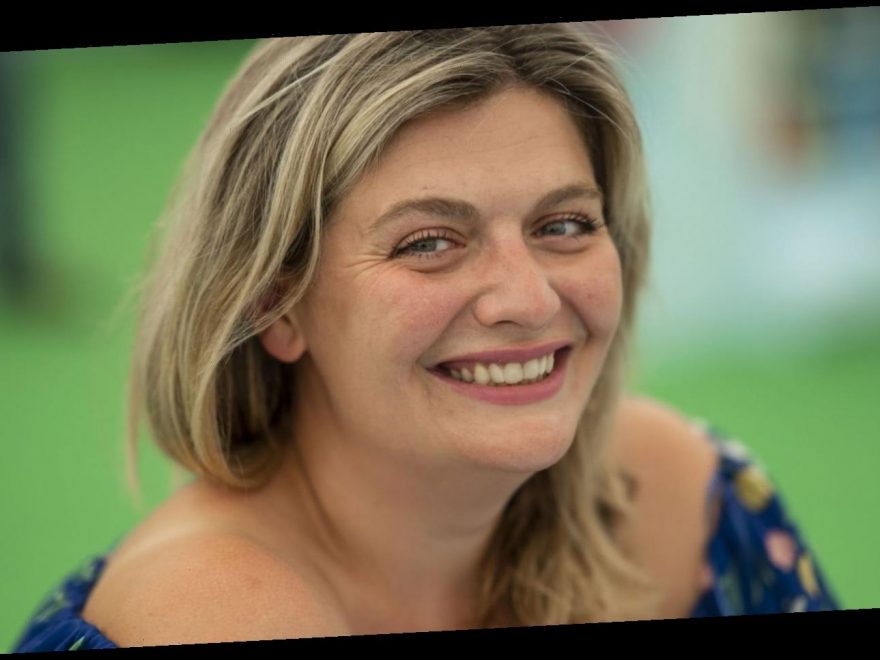The author, mental health advocate and journalist explains her hard-earned lessons about the pursuit of happiness, and how her understanding of OCD began with a Jack Nicholson movie.
“We gaslight ourselves – that’s what depression does to us, that’s one of the main symptoms of mental illnesses. They make you feel like things are all your fault and that you’re being silly.”
It’s taken most of her life, but Bryony Gordon now has a pretty remarkable handle on what havoc both mental illness and poor mental health can wreak on our lives. In an episode of Nobody Told Me…, Stylist’s podcast – sponsored by Clinique – she opens up about what she has learned about sitting with her own feelings, including her sadness.
“If we have this really narrow definition of what mental health is, we’re only feeding into it,” she explains, admitting that her own issues made her feel like a “faulty human being”, whereas now she feels that they were, and are, her brain’s way of trying to protect her.
After numerous battles with conditions such as obsessive compulsive disorder (OCD), bulimia, anxiety and depression, Gordon has found that a large barrier standing between herself and good mental health is the “cult of happy”, which she has learned to renegotiate.
“You don’t have to be happy all the time to be a success, and my aim in life now is to be content. I [may feel] sad or angry but I can still be content. I may feel disconnected from life [sometimes] but it’s okay, because I won’t be feeling this forever.”
You may also like
SAD: what is the difference between seasonal affective disorder and depression?
Gordon’s mental health journey started in a terraced house in West London. She describes her upbringing as idyllic, namechecking her cat called Moppet as evidence, but she was nevertheless an “anxious child”.
From nuclear war to aliens in the attic and believing she could be a serial killer, she worried about everything – even demanding a bell to put by her bed so she could warn her family of house fire as quickly as possible. These thoughts made her feel like a “freak”, as well as isolated from others because she couldn’t believe that feeling mentally ill was “normal”.
She now recognises these early worries and overwhelming low moods as the beginning signs of depression and OCD. After watching Jack Nicholson win an Oscar for his portrayal of the latter in As Good As It Gets, Gordon found an article on the different ways that OCD can manifest itself, including a compulsive relationship with intrusive thoughts. She tore it out of the paper and left it out for her mum to find.
As the years followed, Gordon encountered bulimia, alopecia, depression, anxiety and alcoholism – all while she made her ascent into a successful career in journalism. She interviewed Prince Harry on her podcast Bryony Gordon’s Mad World – discussing his own mental health and near breakdown over the death of his mother Princess Diana, back in 2017.
That same year, she went to rehab herself to treat alcoholism – the day before her daughter started school – and has now been sober for 3.5 years. This decision caused her to re-examine what success and happiness looked like. By this point in her life she had a flourishing career, a husband and a daughter (the point where her first book, the 2014 memoir The Wrong Knickers, ends). From a distance, it looked like a perfect picture.
“I had this notion that because my life had taken the turn that it was supposed to, that I’d been told that it would take in books and films and TV programmes… I thought: ‘you are sorted’. I thought getting married and having a baby would do what rehab does for everybody else.”
But eventually, she could no longer live in denial of her problematic drinking. “I had run out of self-esteem, I was hollowed out over self-loathing,” she says. “And I knew if I didn’t stop drinking, I was going to die.”
While she was initially sceptical about the role of therapy in dealing with mental illness, Gordon is now “evangelical” about all forms of it. “There’s no such thing as talking too much about your mental health, it helps everyone,” she says. Running is another tool of therapy – while she used to use it as a “tool of punishment”, it’s now invaluable in making her feel good and mindful. “I run to be the calmest, not to be fast. I run to slow down,” she says.
Above all, the largest lesson to be learnt from Gordon’s experience of sadness – and every other awful feeling that ill mental health can bring with it – is to learn to sit with it and understand it. This doesn’t make you impervious, but rather helps you to manage it and harness it.
“Getting sober and getting therapy has not meant that I don’t still feel sad, angry, pissed off, depressed even sometimes. I still feel all those things,” she says. “But the difference is I allow myself to feel those things, I know going through them is the best way. I try to go easy on myself and break down why I’m feeling this way.”
Her biggest asset – or “superpower”, has she describes it – is her ability to sit with her own feelings, and knowing that whatever emotion is running throughout your brain, it doesn’t define you. “Just because I’m feeling shit doesn’t mean I am shit,” she says.
If you, or someone you know, is struggling with their mental health, you can find support and resources on mental health charity Mind’s website or see the NHS’s list of mental health helplines and organisations here.
For confidential support, you can also call the Samaritans in the UK on 116 123 or email [email protected].
Images: Getty, Bryony Gordon/Instagram
Source: Read Full Article
